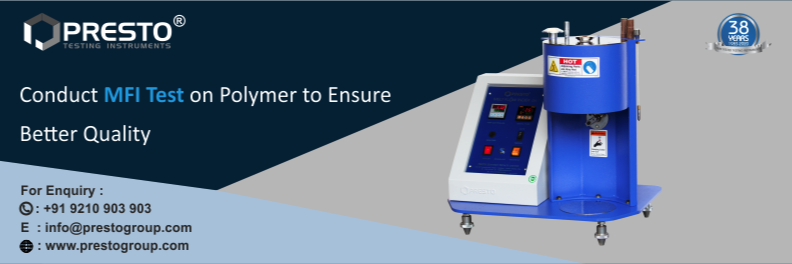

The MFI test is also called as MFR (Melt flow rate) which has been used since the early days of polymer science and material characterisation. The instrument provides data for quick and direct comparison between samples. The MFI of a polymer compound is valuable information to estimate the material’s behaviour at the time of extrusion. The MFI Tester outshines many complex and modern testing machines.
Relative differences in various material characteristics can be implied from MFI data. The melt viscosity at the test temperature is directly related to the MFI as more viscous samples that will flow more slowly. MFI data relates to the molecular weight of the sample. Polymers with longer chains or greater branching require more time to push through the capillary and so flow slowly. Differences in average molecular weight can be detected from a single test. Tests that are conducted at the same temperature with distinct load weights gives information on molecular weight distribution.
MFI gives a rough estimation of shear viscosity of the test sample through an inverse proportional relationship. The test is economical and quicker than various other tests. Melt Flow Index Tester provides analytical value which depends on the testing need. Another interesting application for MFI is that a sample from a failed product can be tested for comparing to the material specification. The MFI analysis identifies if that particular part has been manufactured with the wrong polymer type. If processing pressure and temperature are too high, the polymer will be degraded and some chains will be sheared. The mechanical properties of the product get influenced and the MFI elevates. Various commercial plastic parts contain colorants, additives, and fillers with a polymer blend. Any imbalances in the product ingredients affect the mechanical properties and hence the melt flow results.
Melt Flow Index of materials is the quantity used to distinguish various grades of the polymers and plastics. The melt flow volume of the polymers is inversely proportional to the viscosity of the materials. The materials with high viscosity have more resistance when they flow and the materials having low viscosity flow with low resistance. So, polymers having low molecular weight have a high melt flow rate and the polymers having high molecular weight have a low melt flow rate.
To know more information about its features, price, and technical specifications, give us a call at +91 9210903903 or email us at info@prestogroup.com.
Related Blogs

Hot Air Oven uses dry heat for sterilizing glassware and metal tools, while an Autoclave uses steam under pressure—ideal for liquids and medical items.

GSM of fabric (Grams per Square Meter) indicates fabric weight and thickness. Higher GSM means denser, heavier fabric; lower GSM means lighter, thinner fabric.

Discover why abrasion resistance is crucial for packaging, textiles & plastics. Learn how it's tested (Martindale, Taber, DIN) & why it boosts durability. Save costs with wear-resistant materials!